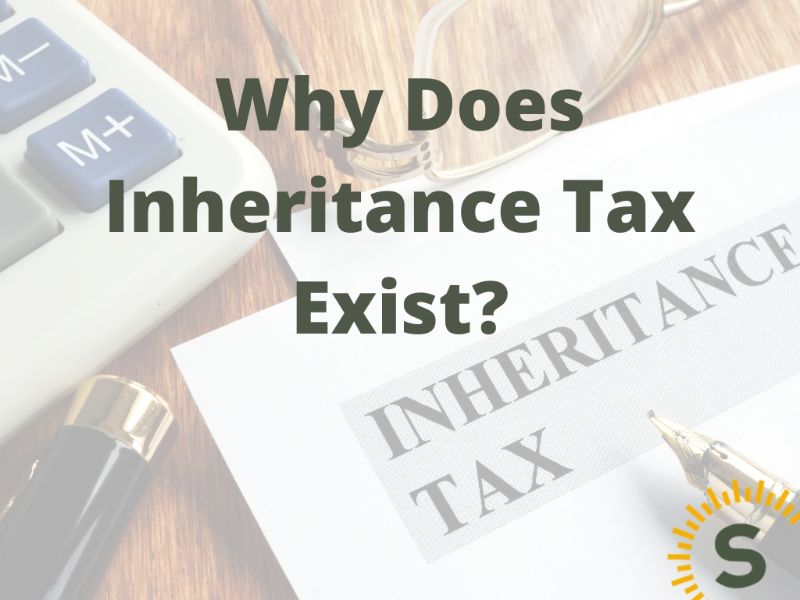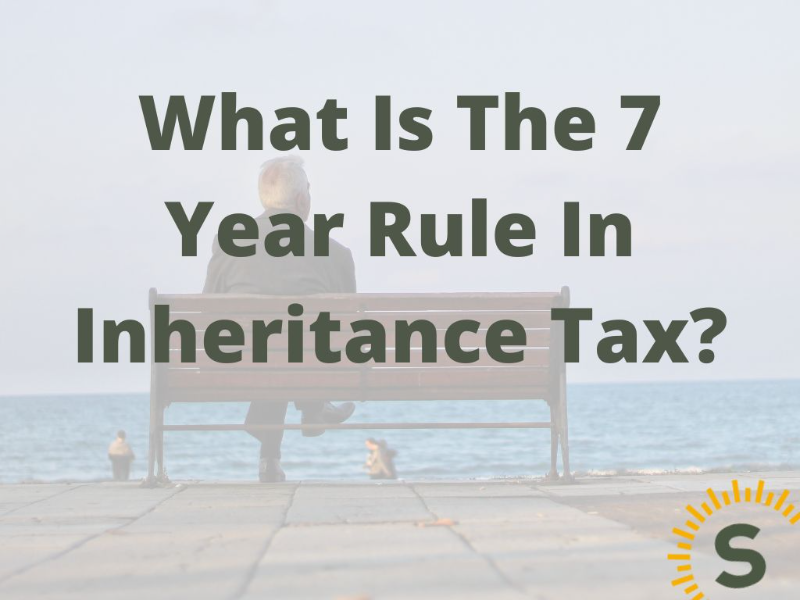
Are you curious about why inheritance tax exists in the UK? Look no further! In this insightful article, we will explore the reasons behind the implementation of this tax and shed light on its purpose. Inheritance tax, also known as the 'death tax,' has been a subject of much debate and controversy. With its aim to redistribute wealth and promote economic equality, understanding its origins and significance is crucial. We will delve into the historical context and legislative framework that led to the creation of this tax, exploring its role in funding public services and supporting social programs. Additionally, we will examine the potential impact of inheritance tax on individuals and families, discussing its pros and cons. Whether you seek a comprehensive overview or hope to gain a deeper understanding of inheritance tax in the UK, this article will provide you with the knowledge you need. So, let's dive in and unravel the mysteries surrounding this important aspect of the British tax system!
Inheritance tax exists in the UK to redistribute wealth, fund public services, and promote economic equality. It prevents asset concentration, supports social programs, and requires informed financial planning to mitigate tax liabilities. Stay informed and seek professional advice.
To fully grasp the reasons behind the existence of inheritance tax in the UK, it is essential to explore its historical background and evolution. Inheritance tax has its roots in ancient civilizations, where wealth was often transferred through inheritance. In the UK, the concept of taxing inherited wealth can be traced back to the 17th century when the Crown imposed various forms of death duties to fund wars and maintain public finances.
The modern inheritance tax system, as we know it today, took shape in 1894 with the introduction of the Estate Duty Act. This act imposed a tax on the transfer of property upon death. Over the years, the tax went through several reforms and changes in rates, thresholds, and exemptions. In 1986, the Inheritance Tax Act replaced the Estate Duty Act, which consolidated the various taxes into a single inheritance tax system.
The implementation of inheritance tax in the UK serves several purposes and is driven by various rationales. One of the primary aims of inheritance tax is to ensure a fair distribution of wealth and prevent the concentration of assets within a few wealthy families. By taxing inherited wealth, the government seeks to promote social and economic equality.
Inheritance tax also plays a crucial role in funding public services and supporting social programs. The revenue generated from inheritance tax contributes to the overall tax revenue, which is utilised for various public expenditures, including healthcare, education, infrastructure development, and welfare programs. In this sense, inheritance tax is seen as a means of redistributing wealth to benefit society as a whole.
Inheritance tax in the UK is not applicable to every estate. There are exemptions and thresholds in place to ensure that only larger estates are subject to the tax. In addition to the nil-rate band, there are several other exemptions and reliefs available that can reduce or eliminate the inheritance tax liability.
One such exemption is the "spouse or civil partner exemption." This allows assets to be passed on to a spouse or civil partner without incurring any inheritance tax liability. Additionally, certain types of assets, such as business assets and agricultural property, may qualify for relief or reduced tax rates under specific conditions.
The impact of inheritance tax on individuals and families can vary depending on the size of the estate and the financial circumstances of the beneficiaries. For larger estates, the tax liability can be substantial and may require careful financial planning to mitigate the impact.
One potential consequence of inheritance tax is the necessity to sell assets to cover the tax liability. This can be particularly burdensome for families who wish to keep inherited assets, such as family homes or businesses, within the family. In some cases, families may be forced to sell or downsize their properties to pay the inheritance tax bill.
Inheritance tax is often surrounded by misconceptions and myths that can lead to misunderstandings and confusion. One common misconception is that everyone is subject to inheritance tax. As mentioned earlier, inheritance tax is only applicable to estates above the nil-rate band threshold.
Another misconception is that giving away assets before death can completely avoid inheritance tax. While giving away assets can reduce the value of the estate and potentially lower the tax liability, there are specific rules in place, such as the "seven-year rule," which determine the tax treatment of gifts made before death.
Given the potential impact of inheritance tax, it is essential for individuals and families to consider strategies for mitigating their tax liabilities. There are several legal and legitimate ways to reduce inheritance tax, such as making use of exemptions and reliefs, setting up trusts, and making charitable donations. This is collectively known as inheritance tax planning.
One common strategy is the use of trusts, which can help protect assets and pass them on to beneficiaries while minimising the tax liability. Trusts can be especially useful for individuals with significant assets or complex family situations.
While we have focused on inheritance tax in the UK, it is worth noting that other countries also have similar taxes in place. However, the rates, thresholds, and exemptions can vary significantly. For example, some countries may have higher or lower tax rates, different thresholds, or alternative tax systems, such as gift taxes or estate taxes.
Inheritance tax has always been a subject of public opinion and political debates. Some argue that the tax is necessary for redistributing wealth and promoting social equality, while others view it as an unfair burden on families and an impediment to economic growth. The debate over inheritance tax often centres around issues of intergenerational wealth transfer, economic mobility, and the role of the state in wealth redistribution.
Over the years, there have been various proposals for changes to the inheritance tax system in the UK. Some argue for increasing the tax-free threshold or introducing additional exemptions and reliefs, while others advocate for more significant reforms, such as replacing inheritance tax with alternative wealth taxes.
The future outlook for inheritance tax remains uncertain, as it is influenced by political, economic, and social factors. Changes in government policies, shifts in public opinion, and evolving societal attitudes towards wealth and inheritance can all shape the future of inheritance tax in the UK.
So why does inheritance tax exist? Well, for several reasons, including the redistribution of wealth, funding public services, and supporting social programs. Its historical roots and legislative framework demonstrate how inheritance tax has evolved over time to become an integral part of the British tax system. Understanding how inheritance tax works, its exemptions and thresholds, and the potential impact on individuals and families is crucial for informed financial planning. While inheritance tax may be a subject of debate and controversy, its significance in promoting economic equality and funding public services cannot be denied. As the future of inheritance tax remains uncertain, staying informed about potential changes and seeking professional financial advice is essential for those affected by this tax.

Stuart is an expert in Property, Money, Banking & Finance, having worked in retail and investment banking for 10+ years before founding Sunny Avenue. Stuart has spent his career studying finance. He holds qualifications in financial studies, mortgage advice & practice, banking operations, dealing & financial markets, derivatives, securities & investments.
 No minimum
No minimum  Newcastle-under-Lyme, Staffordshire
Newcastle-under-Lyme, Staffordshire Free Consultations
Free Consultations
 No minimum
No minimum  No obligation consultation
No obligation consultation
 £51,000+
£51,000+  No obligation consultation
No obligation consultation
 No minimum
No minimum  No obligation consultation
No obligation consultation
 No minimum
No minimum  No obligation consultation
No obligation consultation
 £51,000+
£51,000+  Free Consultations
Free Consultations
 No minimum
No minimum  No obligation consultation
No obligation consultation
 No minimum
No minimum  Leicester, Leicestershire
Leicester, Leicestershire Initial fee free consultation
Initial fee free consultation
 No minimum
No minimum  Free Consultations
Free Consultations
 No minimum
No minimum  No obligation consultation
No obligation consultation
 No minimum
No minimum  Coatbridge, Lanarkshire
Coatbridge, Lanarkshire Initial or Ongoing Consultation Fees
Initial or Ongoing Consultation Fees
 No minimum
No minimum  Initial or Ongoing Consultation Fees
Initial or Ongoing Consultation Fees
 £51,000+
£51,000+  Free Consultations
Free Consultations
 No minimum
No minimum  No obligation consultation
No obligation consultation





Our website offers information about financial products such as investing, savings, equity release, mortgages, and insurance. None of the information on Sunny Avenue constitutes personal advice. Sunny Avenue does not offer any of these services directly and we only act as a directory service to connect you to the experts. If you require further information to proceed you will need to request advice, for example from the financial advisers listed. If you decide to invest, read the important investment notes provided first, decide how to proceed on your own basis, and remember that investments can go up and down in value, so you could get back less than you put in.
Think carefully before securing debts against your home. A mortgage is a loan secured on your home, which you could lose if you do not keep up your mortgage payments. Check that any mortgage will meet your needs if you want to move or sell your home or you want your family to inherit it. If you are in any doubt, seek independent advice.